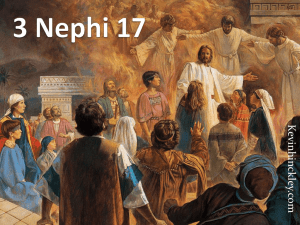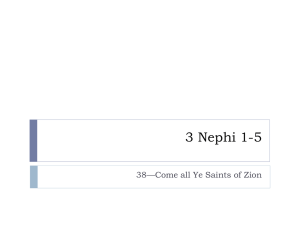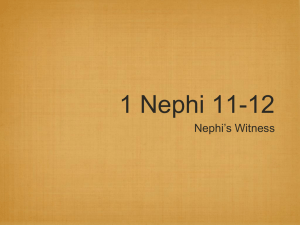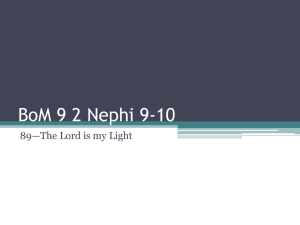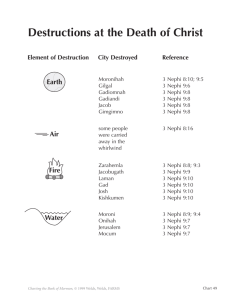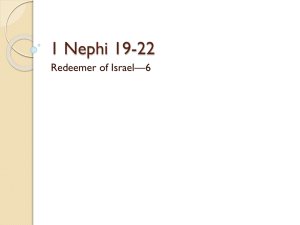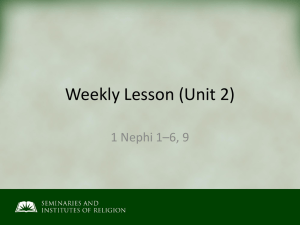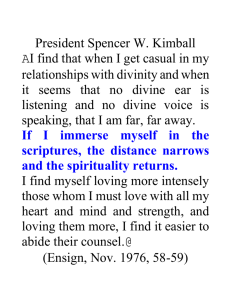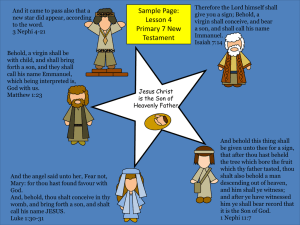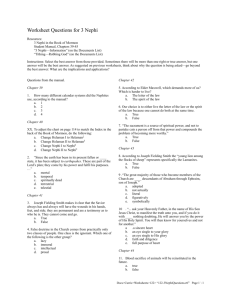Lesson #2: 1 Nephi 6-15 - The Church of Jesus Christ of Latter
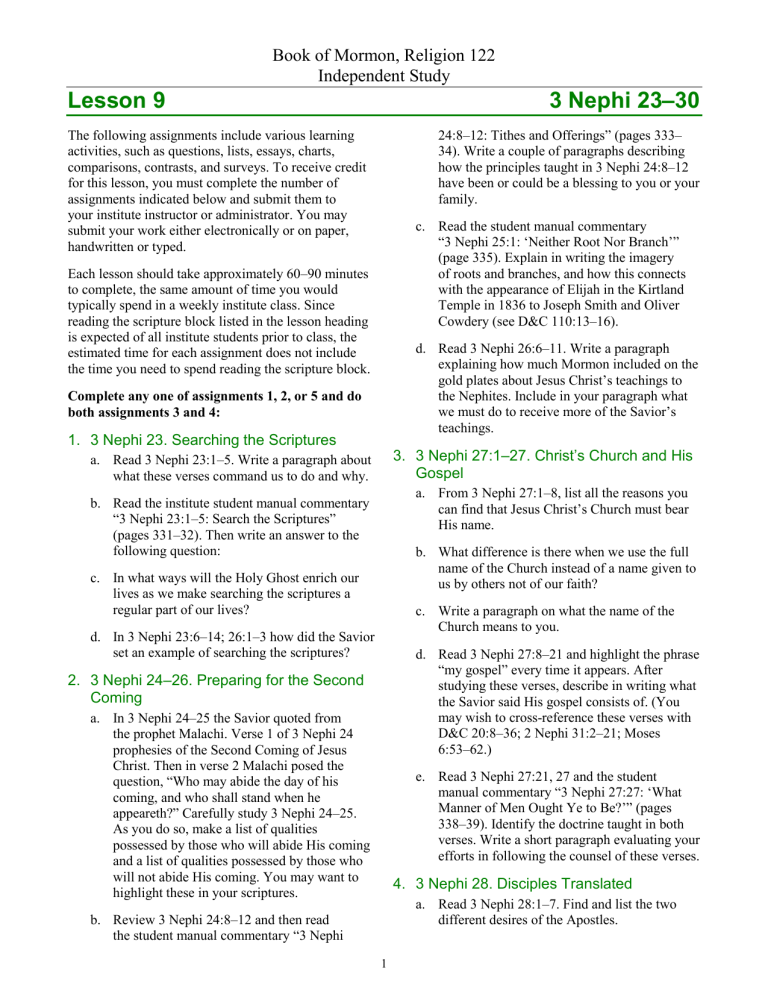
Book of Mormon, Religion 122
Independent Study
Lesson 9 3 Nephi 23 –30
The following assignments include various learning activities, such as questions, lists, essays, charts, comparisons, contrasts, and surveys. To receive credit for this lesson, you must complete the number of assignments indicated below and submit them to your institute instructor or administrator. You may submit your work either electronically or on paper, handwritten or typed.
Each lesson should take approximately 60–90 minutes to complete, the same amount of time you would typically spend in a weekly institute class. Since reading the scripture block listed in the lesson heading is expected of all institute students prior to class, the estimated time for each assignment does not include the time you need to spend reading the scripture block.
Complete any one of assignments 1, 2, or 5 and do both assignments 3 and 4:
1. 3 Nephi 23. Searching the Scriptures
a.
Read 3 Nephi 23:1–5. Write a paragraph about what these verses command us to do and why. b.
Read the institute student manual commentary
“3 Nephi 23:1–5: Search the Scriptures”
(pages 331–32). Then write an answer to the following question: c.
In what ways will the Holy Ghost enrich our lives as we make searching the scriptures a regular part of our lives? d.
In 3 Nephi 23:6–14; 26:1–3 how did the Savior set an example of searching the scriptures?
2. 3 Nephi 24 –26. Preparing for the Second
Coming
a.
In 3 Nephi 24–25 the Savior quoted from the prophet Malachi. Verse 1 of 3 Nephi 24 prophesies of the Second Coming of Jesus
Christ. Then in verse 2 Malachi posed the question, “Who may abide the day of his coming, and who shall stand when he appeareth?” Carefully study 3 Nephi 24–25.
As you do so, make a list of qualities possessed by those who will abide His coming and a list of qualities possessed by those who will not abide His coming. You may want to highlight these in your scriptures. b.
Review 3 Nephi 24:8–12 and then read the student manual commentary “3 Nephi
24:8–12: Tithes and Offerings” (pages 333–
34). Write a couple of paragraphs describing how the principles taught in 3 Nephi 24:8–12 have been or could be a blessing to you or your family. c.
Read the student manual commentary
“3 Nephi 25:1: ‘Neither Root Nor Branch’”
(page 335). Explain in writing the imagery of roots and branches, and how this connects with the appearance of Elijah in the Kirtland
Temple in 1836 to Joseph Smith and Oliver
Cowdery (see D&C 110:13–16). d.
Read 3 Nephi 26:6–11. Write a paragraph explaining how much Mormon included on the gold plates about Jesus Christ’s teachings to the Nephites. Include in your paragraph what we must do to receive more of the Savior’s teachings.
3. 3 Nephi 27:1 –27. Christ’s Church and His
Gospel
a.
From 3 Nephi 27:1–8, list all the reasons you can find that Jesus Christ’s Church must bear
His name. b.
What difference is there when we use the full name of the Church instead of a name given to us by others not of our faith? c.
Write a paragraph on what the name of the
Church means to you. d.
Read 3 Nephi 27:8–21 and highlight the phrase
“my gospel” every time it appears. After studying these verses, describe in writing what the Savior said His gospel consists of. (You may wish to cross-reference these verses with
D&C 20:8–36; 2 Nephi 31:2–21; Moses
6:53–62.) e.
Read 3 Nephi 27:21, 27 and the student manual commentary “3 Nephi 27:27: ‘What
Manner of Men Ought Ye to Be?’” (pages
338–39). Identify the doctrine taught in both verses. Write a short paragraph evaluating your efforts in following the counsel of these verses.
4. 3 Nephi 28. Disciples Translated
a.
Read 3 Nephi 28:1–7. Find and list the two different desires of the Apostles.
1
Lesson 9 b.
After reading the student manual commentary
“3 Nephi 28:9–10, 36–40: The Doctrine of
Translation” (page 339), read 3 Nephi 28:8–40 and make a list of the characteristics of a translated being. c.
Read Alma 11:44 and 3 Nephi 28:39–40.
Using what you learn from these verses, write answers to the following questions:
What greater change was promised to the three disciples, and when will it come?
What do we learn from verse 40 about why this is the greater change?
When will this change occur for everyone?
3 Nephi 23–30
5. 3 Nephi 29
–30. Warnings for Our Day
a.
Read 3 Nephi 29:1–4, 8–9 and make a list of what we should know or do because we have the Book of Mormon. Include on your list any reasons the scriptures give for why we should know or do these things. b.
List the specific warnings Mormon gave in
3 Nephi 29:5–7. Include on your list the consequence of these sins given in verse 7.
Read 3 Nephi 30:2 and make note of the steps someone can take to overcome these kinds of sins. c.
Write a brief statement about why you think
Mormon included these warnings for our day.
2
